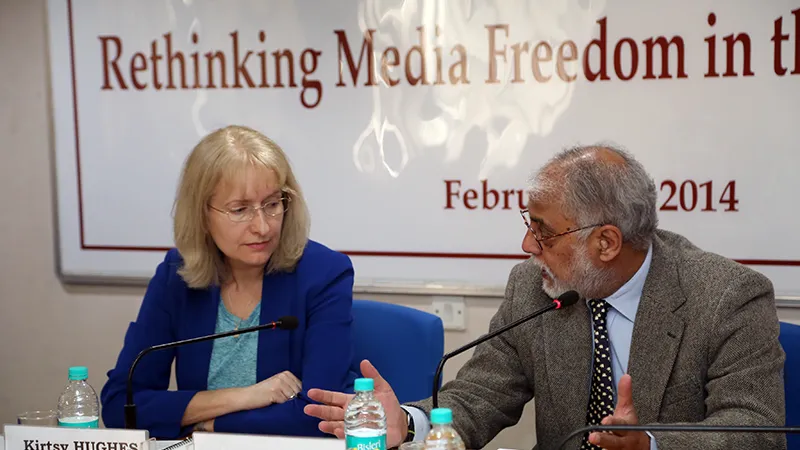In this digital age, how free speech is dealt with in a multipolar world, and the emergence of the new and complex forms of censorship were discussed in a talk on "Rethinking Media Freedom in the Digital Age" at the Observer Research Foundation.

NSA contractor Edward Snowden’s leaked documents revealing a massive surveillance programme of the US around the globe created a lot of furore. In India, issues of censorship were brought forth when Penguin India decided to withdraw Wendy Doniger’s controversial book, The Hindus: An Alternative History. Also, India’s very own surveillance programme -- Central Monitoring System -- which will monitor a cross-section of data on internet and all electronic devices is in the making. All the three cases highlight the attack on free speech and expression and the violation of right to privacy.
In this digital age, how free speech is dealt with in a multipolar world, and the emergence of the new and complex forms of censorship were discussed in a talk on "Rethinking Media Freedom in the Digital Age", on February 26, at the Observer Research Foundation, by Ms Kirsty Hughes, CEO of Index on Censorship, UK. The talk was moderated by Mr Manoj Joshi, Distinguished Fellow, ORF and head of its National Security Initiative.
Opening the discussion, Ms Hughes set forth a number of issues with regard to the theme of the talk. Pointing out that while the freedom of speech remains fundamental to democracy, internet has changed in a lot of radical ways how the freedom of speech and expression is handled. There is also a question of accountability in internet, i.e. who controls the internet.
More than the accountability issue in internet, said Ms Hughes, the debate has taken a shift from the democracy question to "international relations" question. There are geopolitical concerns with respect to who sets free speech and who orders censorship. Ms Hughes referred to the Bali Internet Governance Forum (IGF) last year, where there was a geopolitical clash between nations on the question of control of the internet, pitting Russia and China on one side who wanted a more top-down control, against the US and Europe which wanted the internet to remain "open and accessible". The Snowden revelations made the case worse for digital freedom as the debate shifted entirely to take the colour of a geopolitical question. Brazil is set to host the internet governance summit this April against the background of revelations that the NSA was snooping on her emails and private conversations. On the issue of setting national security in opposition to freedom of speech, Ms Hughes said that it was an old debate in new settings, and states have a tendency to overreach.
Continuing with her discussion on the US mass surveillance programme, Ms Hughes was of the view that while there has been substantial debate on a national level everywhere, there is an absence of democratic discussion on the international plane, which means that no one is in a position to question this all-intrusive mass surveillance program.
Further, Ms Hughes discussed the reliability concerns in digital journalism. Accuracy, verification and reliability remain are often debated in the age of social media where every one of us is a journalist. Ms Hughes said that the right of free speech and the right to privacy need to be balanced against each other, as the two rights go together in many cases. Also, a journalist’s right to invade privacy needs to take into account what is in the ’public interest’. However, on the question of effective journalism and reporting on foreign policy of a state, a state’s national security, and international affairs, Ms Hughes showed her disappointment over the recent High Court of UK and Wales "shocking" decision to uphold the arrest of David Michael Miranda -- the partner of the journalist who published the classified documents on NSA surveillance program-which she said had a chilling effect on press freedom and freedom of expression. she said that there’s a need for sensitising why free speech is important; and that rather than taking down information from the internet, there’s a need to have a national debate on issues of national security, terrorism etc.
On hate speech online and criminalisation of offensive language on social media, Ms Hughes touched upon Turkey’s move to impose drastic curbs on the internet and punish "offensive" content through a bill, and said that while the freedom of speech is not an absolute right but a qualified one, and while laws should apply online as much as it does offline, care needs to be taken that it doesn’t lead to policing fair criticism.
(This report is prepared by Garima Sahdev, Research Assistant, Observer Research Foundation, Delhi)
The views expressed above belong to the author(s). ORF research and analyses now available on Telegram! Click here to access our curated content — blogs, longforms and interviews.




 PREV
PREV

